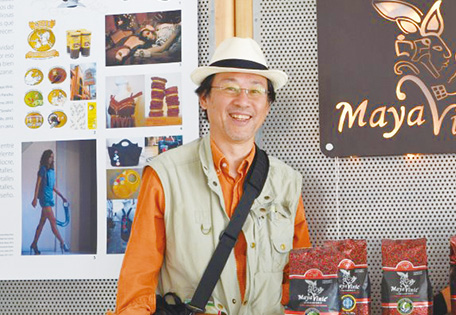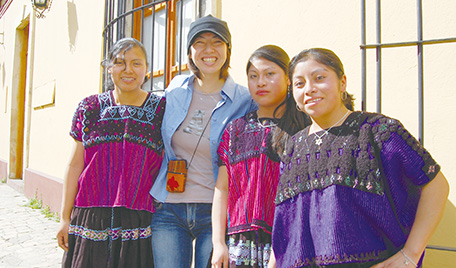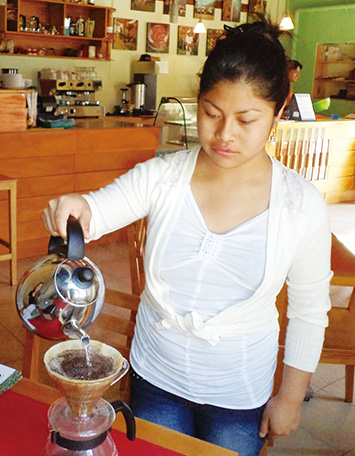Japan's Official Development Assistance White Paper 2013
Stories from the field 19
An Indigenous Union Makes Inroads into Coffee Industry
– JICA Partnership Program and a Café in Mexico –

Mr. Yamamoto stands in front of a signboard for the Maya Vinic Café. (Photo: Junichi Yamamoto)
Every year, countless domestic and foreign tourists travel to San Cristóbal de las Casas, a southern Mexican town in the state of Chiapas where rich indigenous traditions continue to be practiced. Recently, crowds are flocking to a certain store in the town’s shopping district – the Maya Vinic Café. There, customers can enjoy store-roasted coffee ground, brewed and served for each cup. People say, “It’s the best cup of coffee in San Cristóbal de las Casas.”
This café is owned and operated by the Unión de Productores Maya Vinic of Chiapas State. The term “Maya Vinic” means “Mayan people” in the local language. The producers’ union bears the name because all of its members are indigenous Mayan. It is involved in all aspects of the coffee business, from the cultivation, processing, and roasting of the coffee beans to the management of the café, and Japanese support has played a major role in its development thus far.
Supporting Indigenous People through a New Venture in the Coffee Industry
“I never set out to study coffee. But once I was on that ship, I couldn’t very well get off.”
These are the words of Keio University Professor Junichi Yamamoto, a key supporter of Maya Vinic activities. Prof. Yamamoto does field research in Mexico on the structural problems of economic disparities among developed and developing countries. He first became involved with the activities of the Unión de Productores Maya Vinic while doing such field research in 2003, when he met the union’s president by coincidence. The president consulted him about how to export Maya Vinic coffee to Japan.
Income disparity in Mexico is vast. This is especially true for the residents of Chiapas State, who have the lowest average income in the country at one-seventh that of the residents of Mexico City. Furthermore, it is the areas known to be the poorest within the State where most of the indigenous peoples live. There is a great need to find ways by which these indigenous peoples can lift themselves out of poverty and improve their own lives.
Chiapas State is the biggest coffee producing region of Mexico, and is renowned around the world for its prominent organic coffee. One in four people within the State are involved in the coffee industry in some way, with most production being done by small-scale indigenous farmers. Lacking other assets beyond their coffee fields, coffee cultivation is often the only source of cash income for these producers.
From Coffee Cultivation to Café Sales
Prof. Yamamoto talked to students of his seminar about Maya Vinic and they responded enthusiastically about selling the coffee through the fair trade* scheme that would offer an appropriate price for the beans. The activities would not be assistance; rather it would support the efforts of Maya Vinic to participate in fair trade. Prof. Yamamoto started his Fair Trade Project under a motto of “do the practical study without hesitation,” and his students played a major role to start importing Maya Vinic coffee to Japan.
There is a very long path it goes through until the time it is served as a cup of coffee. Producers must cultivate and harvest the beans, process and roast them. Only once all of this is complete do they become the coffee beans that we are familiar with. This process is referred to as the “value chain” of coffee. The income earned from the cultivation, harvest and partial processing done by producers is small, yet once the coffee leaves their hands for roasting and sales in a café, its price rises dramatically. Under normal circumstances, a coffee producer receives only about 1% of the price of one cup of coffee.
Prof. Yamamoto thought that it was important that small-scale producers participate more in the value chain to solve this problem. He believed that if such farmers became involved in the coffee production process from field cultivation to café-based sales, their income would rise and they would be put on the path out of poverty. Prof. Yamamoto resolved on playing a central role in putting the coffee business of the Maya Vinic on track.
His plan was approved as a JICA Partnership Program and the project started in 2006. Phase I was undertaken until 2008 for the improvement of quality control and modernization of management practices.
Opening the Long-awaited Café by Getting through Competing Opinions
Phase II of the project began in 2010 under the themes of coffee processing and roasting, and coffee shop opening and management. The coffee producers, working thus far on only the cultivation of coffee beans, lacked the capacity and capital for management. The aim of the JICA Partnership Program during this phase was to support producers in these areas.
As Prof. Yamamoto continued his activities, he constantly struggled with his desire to have the producers’ union know the value of their coffee. Although they had been cultivating coffee beans, many producers had never correctly enjoyed roasted coffee and did not know how delicious coffee truly tasted. There were even those among the producers who did not like coffee – it was merely a product that they were cultivating in order to make a living. Prof. Yamamoto worked to guide the producers towards taking pride in the coffee they produced. Furthermore, in order to sell higher quality coffee for higher prices, he worked to improve the mindset of the producers towards their product, having them drink and compare different coffees and try high-quality coffee for themselves.
The Maya Vinic had long held the particular desire to manage their own coffee shop, and as such, the project moved in that direction. However, none of the members of the Unión de Productores Maya Vinic had any experience in shop management and they just waited and saw if there would be any good properties for the shop. Prof. Yamamoto encouraged them to visit real-estate agents. After finding a good location, they expected him to provide funding support, but he resolutely refused. He believed that mindset of dependency on assistance must be eliminated if the producers were ever to establish true financial independence.
Japan’s program did not cover the expenses of the store, but instead facilitated training on methods to make drip coffee and customer service. Training was carried out at a café in Mexico City in order to help trainees learn the ins and outs of café management. Experts were invited from Japan, and training sessions were also conducted in Japan to help trainees learn methods for dealing with customer complaints. But the training process did not just transfer Japanese methods to the trainees –
local staff members discussed among themselves what techniques would be most appropriate for San Cristóbal de las Casas. After the training sessions too, there was lively debate among Prof. Yamamoto and the union members about interior design, the cost of stocking the café with coffee, and the price of one cup of coffee. After all was said and done, the Maya Vinic Café finally opened in December 2011.
The Desire to Have Japanese Consumers Experience Maya Vinic Coffee
At this point in our story we meet Ms. Seiko Sugiyama, a woman whose chance meeting with Prof. Yamamoto led to a job selling Maya Vinic coffee as a profession.
During her twenties, Ms. Sugiyama worked as one of JICA’s Japan Overseas Cooperation Volunteers (JOCV) in Africa. In 2006, she was involved in the One Village One Product (OVOP) movement in Malawi. Through her work in Africa, Ms. Sugiyama gained a first-hand understanding of the reality of poverty and began to feel that she wanted not to assist the poor, but to work together with them as a partner.
“Japanese people have the hope that if they work hard they can get any job. But it is different for people in Africa. There are those who never have a chance at getting a job even with hard efforts. Assistance is important, but I want to create job opportunities. Because they are the source of hope.”
Having found an issue she wanted to work on while in Africa, Ms. Sugiyama entered Keio University at the end of her twenties, where she met Professor Yamamoto. She took one of his classes on understanding the structure of poverty in developing countries and was shocked at what she learned. She joined his laboratory and continued her work researching the OVOP movement in Malawi, but at the same time, she was attracted to the Maya Vinic coffee project.
In 2011, Ms. Sugiyama set up a company in Japan to sell Maya Vinic coffee. She did so with the belief that she could play a role of bringing the coffee made with such care by Maya Vinic producers along with a knowledge about the background of the people cultivating coffee to the consumers of Japan.

Ms. Sugiyama with Tzotzil women who are members of the producers’ union. In front of the Maya Vinic Café. (Photo: Seiko Sugiyama)
Promoting the Growth of People and Businesses by Learning Together
In March of 2013, Prof. Yamamoto visited the Maya Vinic Café in San Cristóbal de las Casas for the first time in a long while. Through trial and error, the café had achieved 7.17% of its net profit ratio on its first fiscal year and ensured profitability.
Prof. Yamamoto was particularly happy to see the growth in staff members. For example, 16-year-old Angelica, who had seemed apprehensive at the time of her interview, was now confidently managing the café. The young manager, who previously had been refraining from conflict with other people, issued a complaint to the roasting factory about the quality of roasting and eventually decided to roast beans within the café independently. Prof. Yamamoto said that seeing the staff members enjoy and take pride in their work filled him with a sense of having achieved something beyond the goals of this project to improve livelihoods.
The Unión de Productores Maya Vinic was able to not only cultivate, process, roast, and export high quality coffee, but was also able to run its own coffee shop. Producers with miniscule incomes from coffee cultivation were able to grow those incomes through involvement in added value jobs such as roasting and shop management, and what’s more, they were able to develop a sense of worth and confidence about their jobs.
“In the beginning, I didn’t know that this could be an answer to their problems either. I struggled together with the producers. We discovered new ideas together, we learned together, and I believe that in the end, we grew together.”
These words from Prof. Yamamoto surely teach us that although lifestyles and values may differ, the Japanese and indigenous people of Mexico have much to learn from each other.
* Fair trade attempts to create a safety net ensuring the least possible reduction in incomes for producers due to shifts in international markets (price crashes and so on), natural disasters, or bad weather conditions. This is done by setting a minimum guaranteed price for traded commodities.

Angelica, who mastered the difficult hand drip coffee method and manages the café. (Photo: Yasumasa Ito)
